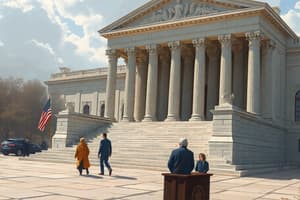Podcast
Questions and Answers
What term describes the practice of drawing electoral district boundaries to benefit a political party?
What term describes the practice of drawing electoral district boundaries to benefit a political party?
- Gerrymandering (correct)
- Apportionment
- Redistricting
- Reapportionment
Which amendment prohibits voting discrimination based on sex?
Which amendment prohibits voting discrimination based on sex?
- 19th Amendment (correct)
- 15th Amendment
- Voting Rights Act of 1965
- 24th Amendment
What is a common consequence of voter ID laws as a backlash to the Voting Rights Act?
What is a common consequence of voter ID laws as a backlash to the Voting Rights Act?
- Restrictions on early voting (correct)
- Decreased voter disenfranchisement
- Increased voter turnout
- Expansion of voter registration
Which type of sampling is characterized by each member of the population having an equal chance of being selected?
Which type of sampling is characterized by each member of the population having an equal chance of being selected?
What did the Shelby County v. Holder (2013) decision primarily address?
What did the Shelby County v. Holder (2013) decision primarily address?
In what way does early voting primarily benefit certain demographics?
In what way does early voting primarily benefit certain demographics?
What is the term for the practice of combining multiple polling places or manipulating voter registration to dilute racial voter influence?
What is the term for the practice of combining multiple polling places or manipulating voter registration to dilute racial voter influence?
Which of the following is an example of a close-ended question?
Which of the following is an example of a close-ended question?
What is the primary purpose of the Supreme Court of the United States (SCOTUS)?
What is the primary purpose of the Supreme Court of the United States (SCOTUS)?
Which model of judicial interpretation prioritizes the text of the law as it is written?
Which model of judicial interpretation prioritizes the text of the law as it is written?
What does the term 'stare decisis' refer to in the judiciary?
What does the term 'stare decisis' refer to in the judiciary?
Which of the following amendments are primarily associated with civil rights?
Which of the following amendments are primarily associated with civil rights?
Which of the following is an example of a discretionary federal spending program?
Which of the following is an example of a discretionary federal spending program?
What is the main distinction between hard money and soft money in the context of campaign financing?
What is the main distinction between hard money and soft money in the context of campaign financing?
In terms of political party organization, what do Hill committees do?
In terms of political party organization, what do Hill committees do?
Which of the following describes the concept of 'iron triangle' in bureaucracy?
Which of the following describes the concept of 'iron triangle' in bureaucracy?
Flashcards
Judicial Federalism
Judicial Federalism
The division of judicial power between federal and state courts, defining their respective jurisdictions.
Judiciary Act of 1789
Judiciary Act of 1789
Established the basic structure of the federal court system.
Stare Decisis
Stare Decisis
A legal doctrine that obligates courts to follow precedents set by previous decisions.
Writ of Certiorari
Writ of Certiorari
Signup and view all the flashcards
Rule of Four
Rule of Four
Signup and view all the flashcards
Civil Liberties
Civil Liberties
Signup and view all the flashcards
Civil Rights
Civil Rights
Signup and view all the flashcards
Incorporation
Incorporation
Signup and view all the flashcards
Bureaucratic Capture
Bureaucratic Capture
Signup and view all the flashcards
Iron Triangle
Iron Triangle
Signup and view all the flashcards
Divided Government
Divided Government
Signup and view all the flashcards
Duverger's Law
Duverger's Law
Signup and view all the flashcards
Political Action Committees (PACs)
Political Action Committees (PACs)
Signup and view all the flashcards
Super PACs
Super PACs
Signup and view all the flashcards
Hard Money
Hard Money
Signup and view all the flashcards
Soft Money
Soft Money
Signup and view all the flashcards
Yellow Journalism
Yellow Journalism
Signup and view all the flashcards
Fairness Doctrine
Fairness Doctrine
Signup and view all the flashcards
Culture of Objectivity
Culture of Objectivity
Signup and view all the flashcards
Telecommunications Act of 1996
Telecommunications Act of 1996
Signup and view all the flashcards
Ideological Bias
Ideological Bias
Signup and view all the flashcards
Gatekeeping Bias
Gatekeeping Bias
Signup and view all the flashcards
Coverage Bias
Coverage Bias
Signup and view all the flashcards
Disinformation
Disinformation
Signup and view all the flashcards
Australian Ballot
Australian Ballot
Signup and view all the flashcards
Split-ticket voting
Split-ticket voting
Signup and view all the flashcards
Primary Elections
Primary Elections
Signup and view all the flashcards
Closed Primary
Closed Primary
Signup and view all the flashcards
Preclearance
Preclearance
Signup and view all the flashcards
Gerrymandering
Gerrymandering
Signup and view all the flashcards
Reapportionment
Reapportionment
Signup and view all the flashcards
Redistricting
Redistricting
Signup and view all the flashcards
Sampling
Sampling
Signup and view all the flashcards
Random Sampling
Random Sampling
Signup and view all the flashcards
Social Desirability Bias
Social Desirability Bias
Signup and view all the flashcards
Study Notes
Judicial Federalism
- Federal vs. state court structure
- Judiciary Act of 1789
- SCOTUS (Supreme Court) final appeal court
SCOTUS Processes
- Stare decisis (precedent)
- Writ of certiorari
- Rule of four
- Petition for certiorari
- Conference vote
- Oral arguments (public)
- Conference meeting
- Majority vote
- Majority opinion
- Dissenting and concurring opinions
- Appointment of justices
- Political limits on the Court
Judicial Decision-Making
- Legalism, attitudinalism , strategic
- Civil Rights vs. Liberties
- Bill of Rights
- Due process
- Habeas corpus
- Bill of Attainder
- Ex post facto law
- Impairment of contracts
- Reconstruction Amendments (13, 14, 15)
- Incorporation
Bureaucracy and Spending
- Bureaucracy
- Bureaucratic capture
- Iron triangle
- Revolving door
- Mandatory vs. discretionary spending
- Federal spending (Social Security, Medicare, Medicaid, Defense)
Political Parties
- Responsible party government
- Divided government
- Bounded rationality
- Party organization (national, Hill, state, local)
- Recruitment of candidates
- Winning elections
- Organizing governance and opposition
Interest Groups
- Economic interests (corporations, businesses, labor)
- Citizen's groups (public interest, single-issue, ideological)
- Government interests
- Political party similarities and differences
- Lobbying (inside and outside)
- Donations
- Going public
- Litigation
- Protesting
- PACs (Political Action Committees)
- Super PACs
- Citizen's United v. FEC (2010)
- Hard money vs. soft money
- Campaign spending
Mass Media
- Mass media (forms, roles)
- Framing and priming
- Partisan vs. independent press
- Yellow Journalism, muckraking
- Fairness Doctrine
- Culture of objectivity
- Telecommunications Act of 1996
- Media Consolidation
- Bias (ideological, gatekeeping, coverage)
- Disinformation and fake news
Voting
- Australian ballot vs. party ballots
- Split ticket voting
- Primary elections (closed, open, top two)
- Caucuses
- Amendments to voting rights
- 15th Amendment (race)
- 19th Amendment (sex)
- Grandfather clauses
- Literacy tests
- Poll taxes
- White primaries
- Voter intimidation
- Voting Rights Act of 1965 (preclearance, coverage formula)
- Backlash to the VRA
- At-large elections
- Appointments
- Purging voter rolls
- Exact match laws
- Shutting down polling locations
- Racial Gerrymandering
- Voter ID laws
- Limiting early voting
- Felon disenfranchisement
- Shelby County v. Holder (2013)
- Voting reforms (early voting, same-day registration, online registration, vote by mail, automatic voter registration)
Gerrymandering and Redistricting
- Gerrymandering (partisan and racial)
- Cracking, packing, hijacking, kidnapping
- Public Opinion
- Sampling (population, sample, inference)
- Non-random sampling
- Quota sampling
- Random sampling
- Probability sampling
- Issues with surveys and polls
- Social desirability bias
- Sampling bias
- Pros and cons of telephone vs. internet surveys
Survey Methodology
- Single-sided vs. two-sided questions
- Double-barreled questions
- Ambiguous questions
- Leading questions
- Response rates, margin of error, polling averages
Studying That Suits You
Use AI to generate personalized quizzes and flashcards to suit your learning preferences.




